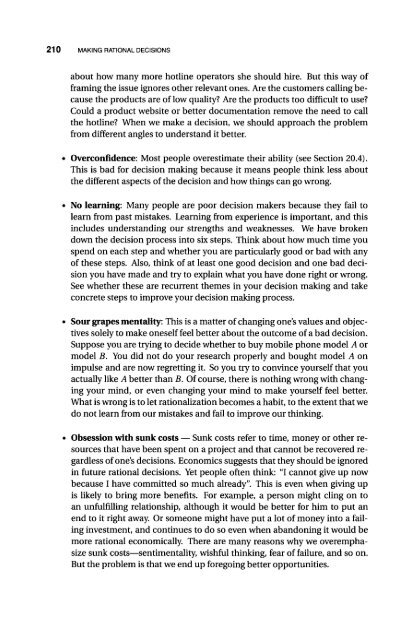An Introduction to Critical Thinking and Creativity - always yours
An Introduction to Critical Thinking and Creativity - always yours
An Introduction to Critical Thinking and Creativity - always yours
You also want an ePaper? Increase the reach of your titles
YUMPU automatically turns print PDFs into web optimized ePapers that Google loves.
210 MAKING RATIONAL DECISIONS<br />
about how many more hotline opera<strong>to</strong>rs she should hire. But this way of<br />
framing the issue ignores other relevant ones. Are the cus<strong>to</strong>mers calling because<br />
the products are of low quality? Are the products <strong>to</strong>o difficult <strong>to</strong> use?<br />
Could a product website or better documentation remove the need <strong>to</strong> call<br />
the hotline? When we make a decision, we should approach the problem<br />
from different angles <strong>to</strong> underst<strong>and</strong> it better.<br />
• Overconfidence: Most people overestimate their ability (see Section 20.4).<br />
This is bad for decision making because it means people think less about<br />
the different aspects of the decision <strong>and</strong> how things can go wrong.<br />
• No learning: Many people are poor decision makers because they fail <strong>to</strong><br />
learn from past mistakes. Learning from experience is important, <strong>and</strong> this<br />
includes underst<strong>and</strong>ing our strengths <strong>and</strong> weaknesses. We have broken<br />
down the decision process in<strong>to</strong> six steps. Think about how much time you<br />
spend on each step <strong>and</strong> whether you are particularly good or bad with any<br />
of these steps. Also, think of at least one good decision <strong>and</strong> one bad decision<br />
you have made <strong>and</strong> try <strong>to</strong> explain what you have done right or wrong.<br />
See whether these are recurrent themes in your decision making <strong>and</strong> take<br />
concrete steps <strong>to</strong> improve your decision making process.<br />
• Sour grapes mentality: This is a matter of changing one's values <strong>and</strong> objectives<br />
solely <strong>to</strong> make oneself feel better about the outcome of a bad decision.<br />
Suppose you are trying <strong>to</strong> decide whether <strong>to</strong> buy mobile phone model A or<br />
model B. You did not do your research properly <strong>and</strong> bought model A on<br />
impulse <strong>and</strong> are now regretting it. So you try <strong>to</strong> convince <strong>yours</strong>elf that you<br />
actually like A better than B. Of course, there is nothing wrong with changing<br />
your mind, or even changing your mind <strong>to</strong> make <strong>yours</strong>elf feel better.<br />
What is wrong is <strong>to</strong> let rationalization becomes a habit, <strong>to</strong> the extent that we<br />
do not learn from our mistakes <strong>and</strong> fail <strong>to</strong> improve our thinking.<br />
• Obsession with sunk costs — Sunk costs refer <strong>to</strong> time, money or other resources<br />
that have been spent on a project <strong>and</strong> that cannot be recovered regardless<br />
of one's decisions. Economics suggests that they should be ignored<br />
in future rational decisions. Yet people often think: "I cannot give up now<br />
because I have committed so much already". This is even when giving up<br />
is likely <strong>to</strong> bring more benefits. For example, a person might cling on <strong>to</strong><br />
an unfulfilling relationship, although it would be better for him <strong>to</strong> put an<br />
end <strong>to</strong> it right away. Or someone might have put a lot of money in<strong>to</strong> a failing<br />
investment, <strong>and</strong> continues <strong>to</strong> do so even when ab<strong>and</strong>oning it would be<br />
more rational economically. There are many reasons why we overemphasize<br />
sunk costs—sentimentality, wishful thinking, fear of failure, <strong>and</strong> so on.<br />
But the problem is that we end up foregoing better opportunities.
















